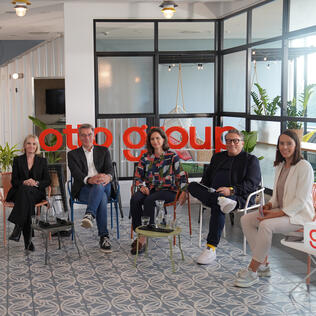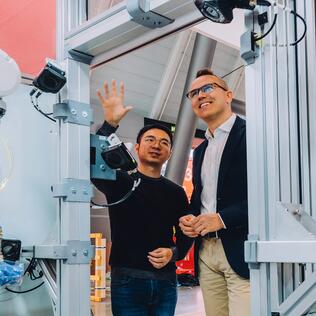Interaction and action: The ZukunftsWerte initiative

The digital transformation offers us numerous opportunities but is also perceived as a threat. In order to be able to approach the anxieties and challenges that come with this, we need interaction and action. The ZukunftsWerte (FutureValues) initiative enables both. The project’s leader Susanne Kertelge tells us how.

Ms. Kertelge, in 2019 the Otto Group established the ZukunftsWerte initiative. Why?
The idea arose from an observation. It had long been clear to us and many others that the digital transformation was moving very quickly and that we needed joint answers and strategies to deal with it responsibly. For example, how do we create structures, in which digitization turns towards people and can be used by them in a sustainable way, rather than turning against them? We knew that such framework conditions can only be set in cooperation with others. But there was no forum where players from politics, business, culture, and civil society could discuss these issue. Everyone was operating in their own silo. With the ZukunftsWerte initiative, we have opened up such a forum.
On what values is the initiative based?
European values form the framework. One of our goals is to contribute to the development of a European model of digitization. One that does not follow the Chinese and American approach, that respects human rights, that is socially responsible and not merely profit-driven. However, we are not primarily interested in finding out what makes us different from the USA or China, but rather what Germany and Europe have in common, what we want to stand up for together, how we want to live and what the consequences of this are. At our meetings, we exchange ideas about which projects we would like to push into the foreground, keeping the above in mind. It is very important to us that we not only talk, but above all act.
Your forum has already met several times. Who was there?
People who want to shape things. Doers, decision-makers, thinkers. People from companies, startups, NGOs, foundations and politicians from the local to the federal level. Our network is constantly expanding. Members of the initiative are always suggesting interesting people who could make valuable contributions. And that was also the first step for us: networking and then thinking together, with an open mind, about what could come out of the initiative. So far, the initiative is limited to Germany, but ultimately we want to operate Europe-wide at some point.
You said that the focus is on actions, not words. Can you tell us about a project that the initiative has already implemented?
At one of our meetings, for example, the founder of ReDI School of Digital Integration presented her project. The ReDI School offers migrants, refugees, and people who cannot afford digital education the opportunity to learn IT skills in courses that are offered free of charge. And the tech school connects its students with companies, which today very often lack employees with digital skills. The presentation was well received, and a group of people who want to further support the ReDI School formed within the ZukunftsWerte initiative. Representatives of the City of Hamburg, the Holistic Foundation, and the Otto Group helped and continue to establish a Hamburg location for the school.
Today, digital transformation encompasses many areas and branches in many directions. How do you stay on top of things?
By first limiting the topics we deal with. We currently focus on the future of work and digital education, as shown by our engagement with the ReDI School. There are certain areas that we, at the Otto Group, have been dealing with for quite some time, areas where we have a certain amount of experience, that we can bring to the initiative’s discussions, and where we can also take direct action. These are topics that directly affect people, because many are concerned that digitization may affect their job security or worry that they will be entirely replaced. That's why digital education and new forms of work are so important — and we would like to help with setting up projects that provide people with new opportunities and more security. If we were to tackle all of the issues related to digitization at the same time, for instance on health topics or IT-related environmental issues, we would quickly lose track. That would contradict our premise of moving quickly from talk to action.
In order to change something, you ultimately need politics as a partner. Do you feel like political decisions can keep up with the speed of digitization?
I don’t believe that it is our job to point our fingers at politicians and say: You’re too slow. Our aim is to promote dialog, and improvements have been made here in recent years. The willingness of politicians to discuss digitization with practitioners, and with companies and experts who experience it on a daily basis, has definitely increased. Politicians take their perspectives into account when making decisions. And the ZukunftsWerte initiative offers a forum that brings these parties together.





